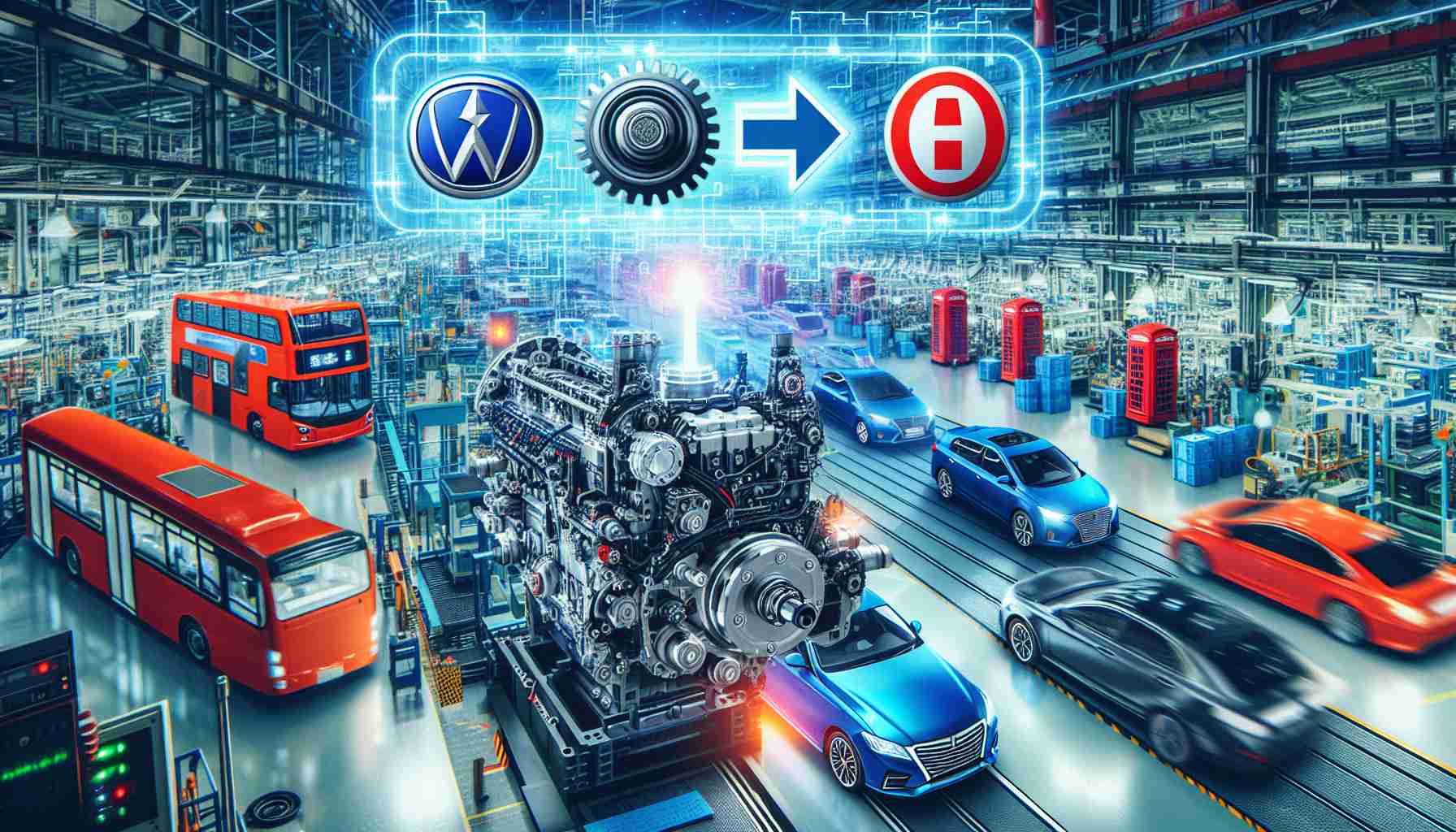Japanese automaker Nissan is poised to enhance its electric vehicle (EV) supply chain through a significant partnership with JATCO Ltd. This collaboration will enable the production of up to 340,000 yearly EV powertrains at a new factory in Sunderland, UK, slated for completion by 2026.
The Sunderland facility represents a strategic maneuver by Nissan to address increasing competition from Chinese manufacturers and aligns with the UK government’s push for stricter EV regulations. This initiative is part of a larger investment of $1.4 billion into the Sunderland plant, which will also produce electric versions of two of Nissan’s car models.
Nissan’s senior vice president for manufacturing highlighted the role of JATCO’s new plant in improving supply chain efficiency, with the facility projected to create approximately 183 jobs in the region. This $59.5 million investment also underscores JATCO’s commitment to its global production capacity, alongside existing sites in Mexico, China, and Thailand.
As Nissan ramps up its EV efforts, the partnership not only addresses immediate business challenges but also reflects broader industry trends, including increasing consumer demand for sustainability. With an eye towards decarbonizing transportation, the production of 340,000 powertrains signifies a commitment to reducing reliance on fossil fuels.
However, the transition to an electrified future comes with complexities, such as balancing the ecological impacts associated with battery material sourcing. Ultimately, Nissan’s strategic investments highlight a pivotal shift in the automotive industry as companies adapt to evolving regulations and consumer preferences—setting the stage for a more sustainable future.
The Future of Electric Mobility: Societal and Environmental Considerations
The partnership between Nissan and JATCO Ltd. signals much more than a strategic business maneuver; it encapsulates a pivotal moment for the societal landscape regarding electric vehicle (EV) adoption. As Nissan gears up to mass-produce EV powertrains, the implications reverberate through various societal sectors. With the automotive industry transitioning to greener alternatives, urban planning, infrastructure development, and individual consumer behavior are all instigated to evolve in anticipation of an electrified future. The local job creation stemming from the new Sunderland facility could foster a community increasingly engaged in clean technology, demonstrating how industry strategies can reshape regional economies.
Culturally, the rise of electric vehicles indicates a shift in consumer consciousness towards sustainability and eco-friendliness. The commitment to producing up to 340,000 powertrains annually reflects a growing demand for environmentally responsible transportation options. As word spreads about the benefits of EVs—lower operating costs, reduced emissions, and the innovative technologies behind them—consumer habits are likely to further shift. The normalization of EVs could redefine societal values around mobility, steering preferences toward more sustainable choices.
On a global economic scale, Nissan’s investment represents a significant movement within the competitive automotive landscape. As governments worldwide impose stricter regulations to mitigate climate change, firms that proactively adapt to these changes may find themselves at the forefront of a burgeoning market. The emphasis on local production in Sunderland not only mitigates risks associated with supply chain disruptions but also positions Nissan favorably against Chinese manufacturers, who have rapidly advanced in the EV sector. This strategic alignment illustrates a microcosm of broader trends in global trade, where localized manufacturing may emerge as a necessary strategy for resilience.
However, the transition to electric vehicles is fraught with challenges that require careful navigation. The environmental implications of sourcing raw materials for batteries must be considered, as demand for lithium, cobalt, and nickel surges. These materials often have significant ecological footprints tied to their extraction processes. The industry must prioritize transparency and ethical sourcing practices to ensure that the push towards a greener future does not come at an unacceptable environmental cost.
Looking ahead, the collaboration between Nissan and JATCO is not merely about scaling production—it reflects a larger trend toward sustainability in the automotive landscape, signaling a collective movement toward decarbonization. As regulations tighten and consumers increasingly favor green options, the strategies employed by manufacturers like Nissan will play a critical role in shaping the future of transportation. The establishment of this new facility is thus a landmark in the ongoing evolution of the automotive industry, spotlighting the essential intersection of technology, environmental responsibility, and consumer advocacy. The long-term significance of such initiatives will undoubtedly influence both market trends and societal norms as we collectively journey toward a more sustainable future.
Decoding Nissan’s Electric Future: Insights and Implications
As Nissan intensifies its commitment to electric vehicles (EVs) with its partnership alongside JATCO Ltd, automation and production scale appear pivotal in reshaping the automotive landscape. With the Sunderland facility expected to manufacture 340,000 powertrains annually by 2026, this strategic move raises key questions and insights relevant not only to Nissan but the automotive industry at large. Here, we explore FAQs, predictions, and implications of this groundbreaking partnership.
Frequently Asked Questions (FAQs)
What will the new Sunderland factory produce?
The newly established facility in Sunderland will manufacture EV powertrains, crucial components that provide power for electric vehicles. It represents a substantial investment in increasing Nissan’s production capabilities for its electric models, responding directly to growing market demands.
How does this investment impact the local economy?
The investment is anticipated to create around 183 jobs in the Sunderland area, which is significant for local employment. Additional indirect job creation in the supply chain and associated industries can also be expected as production ramps up.
What are Nissan’s long-term EV goals?
Nissan aims to enhance its electric vehicle lineup significantly, with a commitment to introducing more eco-friendly models and expanding its market share in response to increasing global consumer interest in sustainability.
Pros and Cons of the Nissan and JATCO Partnership
Pros:
1. Increased Production Capacity: By establishing a new facility, Nissan can significantly boost its output in the face of rising global demand for EVs.
2. Job Creation: This initiative will create local employment opportunities, contributing positively to the UK’s economy.
3. Alignment with Regulatory Trends: The partnership aligns with government regulations advocating for a shift towards EVs, positioning Nissan favorably in the evolving market.
Cons:
1. Environmental Concerns: Sourcing raw materials for batteries poses environmental risks, including habitat destruction and resource depletion.
2. Competitive Market Dynamics: As Nissan increases its capacity, it will face fierce competition, particularly from Chinese manufacturers who are rapidly advancing in EV technology.
Predictions for the Future of Nissan and the Electric Vehicle Market
As Nissan ramps up its EV initiatives, market analysts predict that the partnership with JATCO may allow the firm to innovate at a faster pace than competitors. This could result in the launch of new, impactful EV models that could redefine consumer expectations. Furthermore, with the UK government pushing for stricter EV regulations, other automotive manufacturers might follow suit, creating a domino effect that could accelerate the transition to electrification.
Quick Tips for Consumers Considering Electric Vehicles
1. Research Charging Infrastructure: As more EVs enter the market, check local charging station availability before purchasing.
2. Consider Total Cost of Ownership: Evaluate not just the vehicle price but also savings on fuel and maintenance in the long run.
3. Stay Informed on Incentives: Many governments offer incentives for EV purchases; keep abreast of changing policies for potential savings.
By examining these facets surrounding Nissan’s commitment to electric vehicles, it’s evident that the pathway to a sustainable future is complex but offers significant opportunities for innovation, economic growth, and environmental stewardship. Consider exploring more about the automotive industry’s shift towards EVs at AutoWeek for comprehensive insights.













